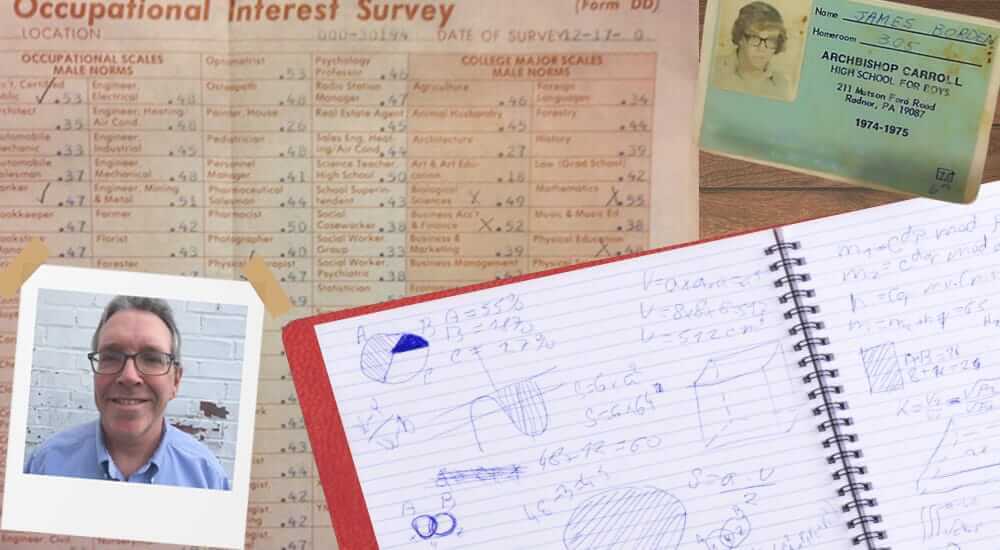
When Jim Borden, associate professor of accounting at Villanova, came across his 1975 Kuder Occupational Interest Survey (KOIS), he was surprised by how closely the college majors and occupations it suggested aligned with what he ended up studying and pursuing as a career. Borden shared his experience in his blog post, “High School Career Survey Turns Out Surprisingly Accurate 40 Years Later.” Here, Borden expands on the topic and tells us how he engages students in self-awareness and career development activities.
When you took the KOIS as a high school senior in 1975, did you put much value on the results?
I can’t recall too well how much value I placed on the results; however, since I did start off college as a math major, which was the number one result on the Kuder survey, I’m not sure if these results influenced such a decision or merely served as confirmation of such a choice.
We’re impressed that you kept your report all these years.
I can’t recall the exact motivation at the time, except for the fact that I just tended to save such reports. I still have my SAT and GMAT scores somewhere, as well as other career survey results. Now it’s fun to look back at these reports.
What advice would you give to students who are taking a Kuder assessment for the first time?
I would share my experience with the results, and encourage them to give some thought to their responses since the results seem to do a good job of teasing out what your interests are, which could be helpful in deciding which college majors or careers to explore.
Why is it important to encourage students to plan for the future?
I think many people – and not just students – do little planning for their future. As a result, they just take what life gives them, as opposed to taking an active role in designing their best life.
In what ways do you incorporate self-awareness and career development exercises in the accounting courses you teach?
In the Introduction to business course that I teach, there are a few different assignments related to such activities.
Students are required to attend at least three professional development events during the course; one event needs to be focused on career exploration, one on major exploration, and one on skill-building (how to interview, how to create a resume, etc.). The students are then required to write a brief reflection paper about the event they attended.
Students are required to prepare a vision board in which they put together a collage of images that represent some goals they would like to achieve, both long-term and short-term, in a variety of areas such as personal, career, health, spiritual, etc.
Johnson & Johnson has been kind enough the past couple of years to pay for the cost of having my students take the Gallup® StrengthsFinder survey. After the surveys are completed, we have a guest speaker from J&J (a former student) visit my class and discuss the results with the students and how such results are used at J&J.
This semester, I’m having students read the book Grit by Angela Duckworth, and then we set aside a few class sessions to discuss the book. I think the message of the book about the importance of sustained effort over a long period of time is a great message for college freshmen to hear.
In one of my upper-level accounting courses, I have the students, mainly seniors, also create a vision board. This past year I also had a guest speaker visit my class and teach the students the value of meditation, and we actually did some meditation exercises.
I think such assignments and activities make students aware of the importance of focusing not only on academics, but on self-development as well while in college.
It sounds like you believe that all students need career guidance. Why?
Most students don’t really know what career options are available with a given major, or even what certain careers entail. In addition, most students will have a variety of careers over their working years. So students first need to be made aware of this fact, and then reflect on what that means and what sort of skills are critical no matter what type of career they pursue (communication skills, critical thinking skills, etc.).
How would you characterize your role in supporting students’ career development?
I view my role as one of encouraging the students to spend some time reflecting on what they would like to accomplish in their life. As noted earlier, I think many people, including students, just drift through life by following the path of least resistance, often doing what someone else has told them they should do.
Tell us about the influence parents have on their children when it comes to college major selection and career choice.
I think parents have a tremendous amount of influence on their children’s choice of major. On the one hand, the parents are key role models for their children, and many children may decide to somehow follow in their parents’ footsteps. In addition, I think most children will actively seek input from their parents on choosing a major. The biggest negative I see is that the children just blindly follow their parents’ advice, and don’t try to add their own thoughts into the process.
I teach in the business school, and I would guess that many students are there because their parents strongly suggested that majoring in business was the right move because they would have a job when they graduate, and not because the students necessarily want to major in business. To me, that’s unfortunate.